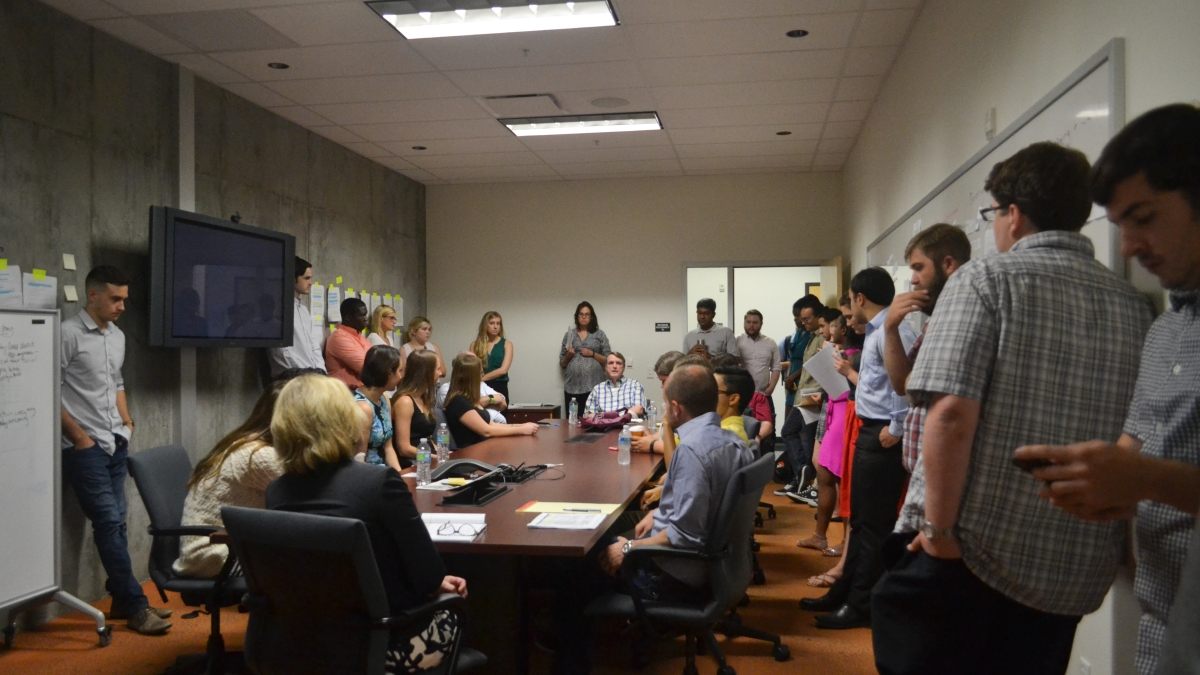18 universities join Carnegie-Knight News21 investigation on drinking water

This year's Carnegie-Knight News21 investigation at ASU looks into walter pollution. Leonard Downie Jr., the Cronkite School's Weil Family Professor and the former executive editor of The Washington Post, meets with News21 fellows during last year's investigation.
Top journalism students from 18 universities will investigate water pollution and its impact on health in the U.S. as part of the 2017 Carnegie-Knight News21 national multimedia reporting initiative.
Headquartered at Arizona State University’s Walter Cronkite School of Journalism and Mass Communication, News21 was established by the Carnegie Corporation of New York and the John S. and James L. Knight Foundation to demonstrate that college journalism students can produce innovative, in-depth multimedia projects on a national scale.
Twenty students from journalism programs across the U.S., as well as Canada and Ireland, will join 10 Cronkite students for the 2017 investigation. They will examine the major issues surrounding water pollution, including contamination sources, legislation, enforcement and health implications.
The students have already begun work. They are participating in a spring semester seminar where they are researching water issues, interviewing experts and beginning their reporting. The seminar is taught in person and via video conference by Leonard Downie Jr., the former executive editor of The Washington Post and Cronkite’s Weil Family Professor of Journalism, and News21 Executive Editor Jacquee Petchel, a Pulitzer Prize-winning journalist and former senior editor for investigations and enterprise at the Houston Chronicle.
Students will hear from such guest speakers as Bob Woodward and Jeff Leen of The Washington Post as well as Erik Olson of the Natural Resources Defense Council and Jenny Rempel of the Community Water Center in California’s Central Valley.
“We chose the safety of drinking water as the 2017 News21 investigative project topic because, after the lead crisis in Flint, Michigan, we discovered that the water consumed by millions of Americans across the country comes from groundwater variously contaminated by lead, industrial waste and chemicals, and agricultural runoff and animal waste,” Downie said. “Too many community water systems and private wells are antiquated and poorly maintained – and government regulators are unable to keep up.”
Following the seminar, students move into paid summer fellowships, during which they work out of a newsroom at the Cronkite School and travel across the country to report and produce their stories.
“In addition to water safety issues, we will be examining how water contamination and safety problems affect people in disadvantaged communities, remote communities and places where the issue is sometimes overlooked or ignored,” said Petchel, who directs the summer reporting effort. “The advantage of a national investigation is that we’ll be investigating the topic in every state and reaching out to people everywhere, as well as examining state and national data.”
Previous Carnegie-Knight News21 projects have spotlighted issues ranging from food safety and gun rights and regulations to veterans’ issues and voting rights. The student work is published at news21.com and by dozens of news organizations, including The Washington Post, USA Today, NBCnews.com and the Center for Public Integrity.
Cronkite fellows will be named later this semester. This year’s participating universities and their fellows are:
- ASU’s Cronkite School
- American University’s School of Communication: Jordan Houston
- Dublin City University’s School of Communications (Ireland): Fionnuala O'Leary and Amy Molloy
- Elon University’s School of Communications: Bryan Anderson
- George Washington’s University School of Media and Public Affairs: Elissa Nunez
- Hofstra University’s Department of Journalism, Media Studies, and Public Relations: Briana Smith
- Kent State University’s School of Journalism and Mass Communication: Karl Schneider
- Louisiana State University’s Manship School of Mass Communication: William Potter
- St. Bonaventure University’s Jandoli School of Communication: Rachel Konieczny
- Syracuse University’s S. I. Newhouse School of Public Communications: Michael Santiago
- Texas Christian University’s Bob Schieffer College of Communication: Brandon Kitchin
- University of Alabama’s Department of Journalism and Creative Media: Bryn Caswell
- University of British Columbia’s Graduate School of Journalism (Canada): Lauren Kaljur
- University of North Texas’s Mayborn School of Journalism: Alexis Reese
- University of Oklahoma's Gaylord College of Journalism and Mass Communication: Macee Beheler, Elizabeth Sims and Bekah York
- University of Southern California’s Annenberg School for Communication and Journalism: Rachel Ramos
- University of Tennessee’s School of Journalism & Electronic Media: Bliss Zechman
- University of Texas at Austin’s School of Journalism: Jackie Wang
Individual students are funded by their universities and by individual donors, foundations and news organizations. The Ethics and Excellence in Journalism Foundation supports fellows from the University of Oklahoma and ASU and the Hearst Foundations and the Donald W. Reynolds Foundation support ASU fellows. Knight Foundation supports American University and USC fellows; The Dallas Morning News supports the University of North Texas fellow; John and Patty Williams support the University of Tennessee fellow; Louis A. “Chip” Weil supports an ASU fellow; and the International Ireland Funds supports a Dublin City University fellow.
More Law, journalism and politics

Native Vote works to ensure the right to vote for Arizona's Native Americans
The Navajo Nation is in a remote area of northeastern Arizona, far away from the hustle of urban life. The 27,400-acre…

New report documents Latinos’ critical roles in AI
According to a new report that traces the important role Latinos are playing in the growth of artificial intelligence technology…

ASU's Carnegie-Knight News21 project examines the state of American democracy
In the latest project of Carnegie-Knight News21, a national reporting initiative and fellowship headquartered at Arizona State…